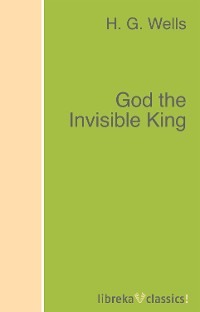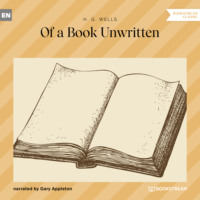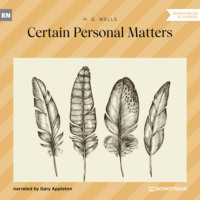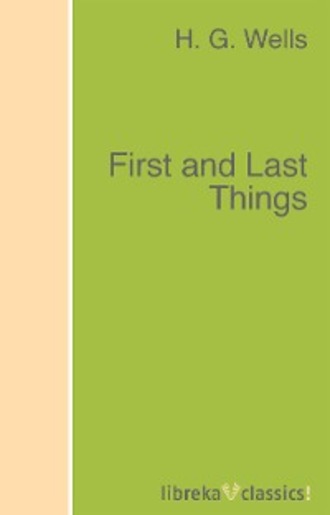
Полная версия
First and Last Things
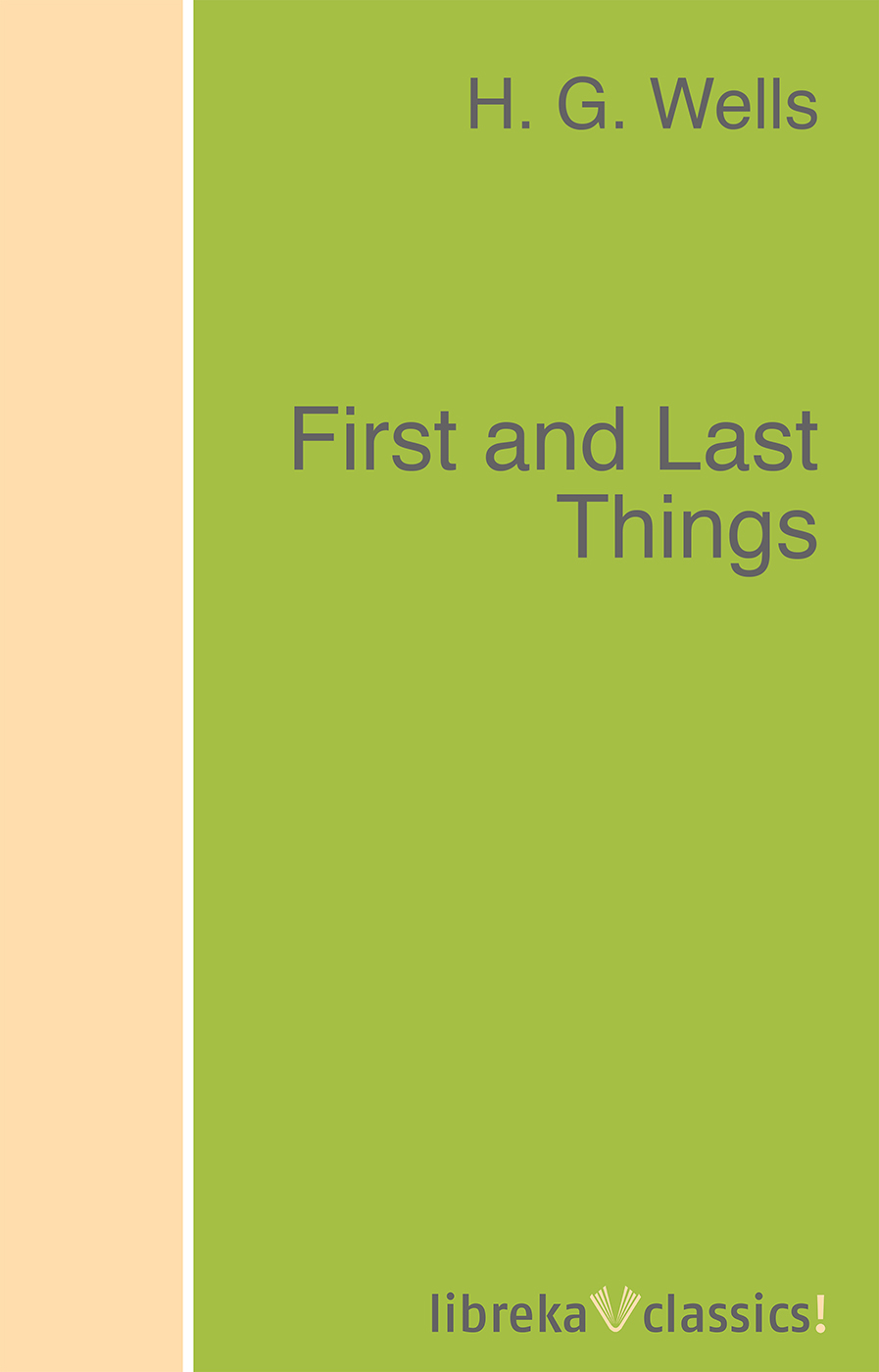

Titel: First and Last Things
von Oliver Goldsmith, Samuel Pepys, William Dean Howells, John Burroughs, William Harmon Norton, L. Mühlbach, Franklin Knight Lane, Walter Pater, Jonathan Swift, Augusta J. Evans, Trumbull White, Kathleen Thompson Norris, Matthew Arnold, Charles W. Colby, Shakespeare, James Fenimore Cooper, D. H. Lawrence, James Joyce, Ada Cambridge, Philip E. Muskett, Catherine Helen Spence, Rolf Boldrewood, Ernest Scott, Fergus Hume, H. G. Wells
ISBN 978-3-7429-4083-4
Alle Rechte vorbehalten.
Es ist ohne vorherige schriftliche Erlaubnis nicht gestattet, dieses Werk im Ganzen oder in Teilen zu vervielfältigen oder zu veröffentlichen.
FIRST AND LAST THINGS
A CONFESSION OF FAITH AND RULE OF LIFE
By H.G. Wells
Contents
INTRODUCTION. BOOK THE FIRST. — METAPHYSICS. 1.1. THE NECESSITY FOR METAPHYSICS. 1.2. THE RESUMPTION OF METAPHYSICAL ENQUIRY. 1.3. THE WORLD OF FACT. 1.4. SCEPTICISM OF THE INSTRUMENT. 1.5. THE CLASSIFICATORY ASSUMPTION. 1.6. EMPTY TERMS. 1.7. NEGATIVE TERMS. 1.8. LOGIC STATIC AND LIFE KINETIC. 1.9. PLANES AND DIALECTS OF THOUGHT. 1.10. PRACTICAL CONCLUSIONS FROM THESE CONSIDERATIONS. 1.11. BELIEFS. 1.12. SUMMARY. BOOK THE SECOND — OF BELIEFS 2.1. MY PRIMARY ACT OF FAITH. 2.2. ON USING THE NAME OF GOD. 2.3. FREE WILL AND PREDESTINATION. 2.4. A PICTURE OF THE WORLD OF MEN. 2.5. THE PROBLEM OF MOTIVES THE REAL PROBLEM OF LIFE. 2.6. A REVIEW OF MOTIVES. 2.7. THE SYNTHETIC MOTIVE. 2.8. THE BEING OF MANKIND. 2.9. INDIVIDUALITY AN INTERLUDE. 2.10. THE MYSTIC ELEMENT. 2.11. THE SYNTHESIS. 2.12. OF PERSONAL IMMORTALITY. 2.13. A CRITICISM OF CHRISTIANITY. 2.14. OF OTHER RELIGIONS. 2.15. BOOK THE THIRD — OF GENERAL CONDUCT 3.1. CONDUCT FOLLOWS FROM BELIEF. 3.2. WHAT IS GOOD? 3.3. SOCIALISM. 3.4. A CRITICISM OF CERTAIN FORMS OF SOCIALISM. 3.5. HATE AND LOVE. 3.6. THE PRELIMINARY SOCIAL DUTY. 3.7. WRONG WAYS OF LIVING. 3.8. SOCIAL PARASITISM AND CONTEMPORARY INJUSTICES. 3.9. THE CASE OF THE WIFE AND MOTHER. 3.10. ASSOCIATIONS. 3.11. OF AN ORGANIZED BROTHERHOOD. 3.12. CONCERNING NEW STARTS AND NEW RELIGIONS. 3.13. THE IDEA OF THE CHURCH. 3.14. OF SECESSION. 3.15. A DILEMMA. 3.16. A COMMENT. 3.17. WAR. 3.18. WAR AND COMPETITION. 3.19. MODERN WAR. 3.20. OF ABSTINENCES AND DISCIPLINES. 3.21. ON FORGETTING, AND THE NEED OF PRAYER, READING, DISCUSSION AND WORSHIP 3.22. DEMOCRACY AND ARISTOCRACY. 3.23. ON DEBTS OF HONOUR. 3.24. THE IDEA OF JUSTICE. 3.25. OF LOVE AND JUSTICE. 3.26. THE WEAKNESS OF IMMATURITY. 3.27. POSSIBILITY OF A NEW ETIQUETTE. 3.28. SEX. 3.29. THE INSTITUTION OF MARRIAGE. 3.30. CONDUCT IN RELATION TO THE THING THAT IS. 3.31. CONDUCT TOWARDS TRANSGRESSORS. BOOK THE FOURTH — SOME PERSONAL THINGS. 4.1. PERSONAL LOVE AND LIFE. 4.2. THE NATURE OF LOVE. 4.3. THE WILL TO LOVE. 4.4. LOVE AND DEATH. 4.5. THE CONSOLATION OF FAILURE. 4.6. THE LAST CONFESSION.
INTRODUCTION.
Recently I set myself to put down what I believe. I did this with no idea of making a book, but at the suggestion of a friend and to interest a number of friends with whom I was associated. We were all, we found, extremely uncertain in our outlook upon life, about our religious feelings and in our ideas of right and wrong. And yet we reckoned ourselves people of the educated class and some of us talk and lecture and write with considerable confidence. We thought it would be of very great interest to ourselves and each other if we made some sort of frank mutual confession. We arranged to hold a series of meetings in which first one and then another explained the faith, so far as he understood it, that was in him. We astonished ourselves and our hearers by the irregular and fragmentary nature of the creeds we produced, clotted at one point, inconsecutive at another, inconsistent and unconvincing to a quite unexpected degree. It would not be difficult to caricature one of those meetings; the lecturer floundering about with an air of exquisite illumination, the audience attentive with an expression of thwarted edification upon its various brows. For my own part I grew so interested in planning my lecture and in joining up point and point, that my notes soon outran the possibilities of the hour or so of meeting for which I was preparing them. The meeting got only a few fragments of what I had to say, and made what it could of them. And after that was over I let myself loose from limits of time and length altogether and have expanded these memoranda into a book.
It is as it stands now the frank confession of what one man of the early Twentieth Century has found in life and himself, a confession just as frank as the limitations of his character permit; it is his metaphysics, his religion, his moral standards, his uncertainties and the expedients with which he has met them. On every one of these departments and aspects I write—how shall I put it?—as an amateur. In every section of my subject there are men not only of far greater intellectual power and energy than I, but who have devoted their whole lives to the sustained analysis of this or that among the questions I discuss, and there is a literature so enormous in the aggregate that only a specialist scholar could hope to know it. I have not been unmindful of these professors and this literature; I have taken such opportunities as I have found, to test my propositions by them. But I feel that such apology as one makes for amateurishness in this field has a lesser quality of self-condemnation than if one were dealing with narrower, more defined and fact-laden matters. There is more excuse for one here than for the amateur maker of chemical theories, or the man who evolves a system of surgery in his leisure. These things, chemistry, surgery and so forth, we may take on the reputation of an expert, but our own fundamental beliefs, our rules of conduct, we must all make for ourselves. We may listen and read, but the views of others we cannot take on credit; we must rethink them and "make them our own." And we cannot do without fundamental beliefs, explicit or implicit. The bulk of men are obliged to be amateur philosophers,—all men indeed who are not specialized students of philosophical subjects,—even if their philosophical enterprise goes no further than prompt recognition of and submission to Authority.
And it is not only the claim of the specialist that I would repudiate. People are too apt to suppose that in order to discuss morals a man must have exceptional moral gifts. I would dispute that naive supposition. I am an ingenuous enquirer with, I think, some capacity for religious feeling, but neither a prophet nor a saint. On the whole I should be inclined to classify myself as a bad man rather than a good; not indeed as any sort of picturesque scoundrel or non-moral expert, but as a person frequently irritable, ungenerous and forgetful, and intermittently and in small but definite ways bad. One thing I claim, I have got my beliefs and theories out of my life and not fitted them to its circumstances. As often as not I have learnt good by the method of difference; by the taste of the alternative. I tell this faith I hold as I hold it and I sketch out the principles by which I am generally trying to direct my life at the present time, because it interests me to do so and I think it may interest a certain number of similarly constituted people. I am not teaching. How far I succeed or fail in that private and personal attempt to behave well, has nothing to do with the matter of this book. That is another story, a reserved and private affair. I offer simply intellectual experiences and ideas.
It will be necessary to take up the most abstract of these questions of belief first, the metaphysical questions. It may be that to many readers the opening sections may seem the driest and least attractive. But I would ask them to begin at the beginning and read straight on, because much that follows this metaphysical book cannot be appreciated at its proper value without a grasp of these preliminaries.
BOOK THE FIRST. — METAPHYSICS.
1.1. THE NECESSITY FOR METAPHYSICS.
As a preliminary to that experiment in mutual confession from which this book arose, I found it necessary to consider and state certain truths about the nature of knowledge, about the meaning of truth and the value of words, that is to say I found I had to begin by being metaphysical. In writing out these notes now I think it is well that I should state just how important I think this metaphysical prelude is.
There is a popular prejudice against metaphysics as something at once difficult and fruitless, as an idle system of enquiries remote from any human interest. I suppose this odd misconception arose from the vulgar pretensions of the learned, from their appeal to ancient names and their quotations in unfamiliar tongues, and from the easy fall into technicality of men struggling to be explicit where a high degree of explicitness is impossible. But it needs erudition and accumulated and alien literature to make metaphysics obscure, and some of the most fruitful and able metaphysical discussion in the world was conducted by a number of unhampered men in small Greek cities, who knew no language but their own and had scarcely a technical term. The true metaphysician is after all only a person who says, "Now let us take a thought for a moment before we fall into a discussion of the broad questions of life, lest we rush hastily into impossible and needless conflict. What is the exact value of these thoughts we are thinking and these words we are using?" He wants to take thought about thought. Those other ardent spirits on the contrary, want to plunge into action or controversy or belief without taking thought; they feel that there is not time to examine thought. "While you think," they say, "the house is burning." They are the kin of those who rush and struggle and make panics in theatre fires.
Now it seems to me that most of the troubles of humanity are really misunderstandings. Men's compositions and characters are, I think, more similar than their views, and if they had not needlessly different modes of expression upon many broad issues, they would be practically at one upon a hundred matters where now they widely differ.
Most of the great controversies of the world, most of the wide religious differences that keep men apart, arise from this: from differences in their way of thinking. Men imagine they stand on the same ground and mean the same thing by the same words, whereas they stand on slightly different grounds, use different terms for the same thing and express the same thing in different words. Logomachies, conflicts about words,—into such death-traps of effort those ardent spirits run and perish.
This is now almost a commonplace; it has been said before by numberless people. It has been said before by numberless people, but it seems to me it has been realised by very few—and until it is realised to the fullest extent, we shall continue to live at intellectual cross purposes and waste the forces of our species needlessly and abundantly.
This persuasion is a very important thing in my mind.
I think that the time has come when the human mind must take up metaphysical discussion again—when it must resume those subtle but necessary and unavoidable problems that it dropped unsolved at the close of the period of Greek freedom, when it must get to a common and general understanding upon what its ideas of truth, good, and beauty amount to, and upon the relation of the name to the thing, and of the relation of one mind to another mind in the matter of resemblance and the matter of difference—upon all those issues the young science student is as apt to dismiss as Rot, and the young classical student as Gas, and the austere student of the science of Economics as Theorising, unsuitable for his methods of research.
In our achievement of understandings in the place of these evasions about fundamental things lies the road, I believe, along which the human mind can escape, if ever it is to escape, from the confusion of purposes that distracts it at the present time.
1.2. THE RESUMPTION OF METAPHYSICAL ENQUIRY.
It seems to me that the Greek mind up to the disaster of the Macedonian Conquest was elaborately and discursively discussing these questions of the forms and methods of thought and that the discussion was abruptly closed and not naturally concluded, summed up hastily as it were, in the career and lecturings of Aristotle.
Since then the world never effectually reopened these questions until the modern period. It went on from Plato and Aristotle just as the art of the seventeenth and eighteenth century went on from Raphael and Michael Angelo. Effectual criticism was absolutely silent until the Renaissance, and then for a time was but a matter of scattered utterances having only the slightest collective effect. In the past half century there has begun a more systematic critical movement in the general mind, a movement analogous to the Pre-Raphaelite movement in art—a Pre-Aristotelian movement, a scepticism about things supposed to be settled for all time, a resumed inquiry into the fundamental laws of thought, a harking back to positions of the older philosophers and particularly to Heraclitus, so far as the surviving fragments of his teaching enable one to understand him, and a new forward movement from that recovered ground.
1.3. THE WORLD OF FACT.
Necessarily when one begins an inquiry into the fundamental nature of oneself and one's mind and its processes, one is forced into autobiography. I begin by asking how the conscious mind with which I am prone to identify myself, began.
It presents itself to me as a history of a perception of the world of facts opening out from an accidental centre at which I happened to begin.
I do not attempt to define this word fact. Fact expresses for me something in its nature primary and unanalyzable. I start from that. I take as a typical statement of fact that I sit here at my desk writing with a fountain pen on a pad of ruled scribbling paper, that the sunlight falls upon me and throws the shadow of my window mullion across the page, that Peter, my cat, sleeps on the window-seat close at hand and that this agate paper-weight with the silver top that once was Henley's holds my loose memoranda together. Outside is a patch of lawn and then a fringe of winter-bitten iris leaves and then the sea, greatly wrinkled and astir under the south-west wind. There is a boat going out which I think may be Jim Pain's, but of that I cannot be sure...
These are statements of a certain quality, a quality that extends through a huge universe in which I find myself placed.
I try to recall how this world of fact arose in my mind. It began with a succession of limited immediate scenes and of certain minutely perceived persons; I recall an underground kitchen with a drawered table, a window looking up at a grating, a back yard in which, growing out by a dustbin, was a grape-vine; a red-papered room with a bookcase over my father's shop, the dusty aisles and fixtures, the regiments of wine-glasses and tumblers, the rows of hanging mugs and jugs, the towering edifices of jam-pots, the tea and dinner and toilet sets in that emporium, its brighter side of cricket goods, of pads and balls and stumps. Out of the window one peeped at the more exterior world, the High Street in front, the tailor's garden, the butcher's yard, the churchyard and Bromley church tower behind; and one was taken upon expeditions to fields and open places. This limited world was peopled with certain familiar presences, mother and father, two brothers, the evasive but interesting cat, and by intermittent people of a livelier but more transient interest, customers and callers.
Such was my opening world of fact, and each day it enlarged and widened and had more things added to it. I had soon won my way to speech and was hearing of facts beyond my visible world of fact. Presently I was at a Dame's school and learning to read.
From the centre of that little world as primary, as the initiatory material, my perception of the world of fact widened and widened, by new sights and sounds, by reading and hearing descriptions and histories, by guesses and inferences; my curiosity and interest, my appetite for fact, grew by what it fed upon, I carried on my expansion of the world of fact until it took me through the mineral and fossil galleries of the Natural History Museum, through the geological drawers of the College of Science, through a year of dissection and some weeks at the astronomical telescope. So I built up my conceptions of a real world out of facts observed and out of inferences of a nature akin to fact, of a world immense and enduring, receding interminably into space and time. In that I found myself placed, a creature relatively infinitesimal, needing and struggling. It was clear to me, by a hundred considerations, that I in my body upon this planet Earth, was the outcome of countless generations of conflict and begetting, the creature of natural selection, the heir of good and bad engendered in that struggle.
So my world of fact shaped itself. I find it altogether impossible to question or doubt that world of fact. Particular facts one may question as facts. For instance, I think I see an unseasonable yellow wallflower from my windows, but you may dispute that and show that it is only a broken end of iris leaf accidentally lit to yellow. That is merely a substitution of fact for fact. One may doubt whether one is perceiving or remembering or telling facts clearly, but the persuasion that there are facts, independent of one's interpretations and obdurate to one's will, remains invincible.
1.4. SCEPTICISM OF THE INSTRUMENT.
At first I took the world of fact as being exactly as I perceived it. I believed my eyes. Seeing was believing, I thought. Still more did I believe my reasoning. It was only slowly that I began to suspect that the world of fact could be anything different from the clear picture it made upon my mind.
I realised the inadequacy of the senses first. Into that I will not enter here. Any proper text book of physiology or psychology will supply a number of instances of the habitual deceptions of sight and touch and hearing. I came upon these things in my reading, in the laboratory, with microscope or telescope, lived with them as constant difficulties. I will only instance one trifling case of visual deception in order to lead to my next question. One draws two lines strictly parallel; so
(two horizontal and parallel lines.)
Oblique to them one draws a series of lines; so
(a series of parallel and closely-spaced lines drawn through each horizontal line, one series (top) sloping to the right, the other (bottom) to the left)
and instantly the parallelism seems to be disturbed. If the second figure is presented to any one without sufficient science to understand this delusion, the impression is created that these lines converge to the right and diverge to the left. The vision is deceived in its mental factor and judges wrongly of the thing seen.
In this case we are able to measure the distance of the lines, to find how the main lines looked before the cross ones were drawn, to bring the deception up against fact of a different sort and so correct the mistake. If the ignorant observer were unable to do that, he might remain permanently under the impression that the main lines were out of parallelism. And all the infirmities of eye and ear, touch and taste, are discovered and checked by the fact that the erroneous impressions presently strike against fact and discover an incompatibility with it. If they did not we should never have discovered them. If on the other hand they are so incompatible with fact as to endanger the lives of the beings labouring under such infirmities, they would tend to be eliminated from among our defects.
The presumption to which biological science brings one is that the senses and mind will work as well as the survival of the species may require, but that they will not work so very much better. There is no ground in matter-of-fact experience for assuming that there is any more inevitable certitude about purely intellectual operations than there is about sensory perceptions. The mind of a man may be primarily only a food-seeking, danger-avoiding, mate-finding instrument, just as the mind of a dog is, just as the nose of a dog is, or the snout of a pig.
You see the strong preparatory reason there is in this view of life for entertaining the suppositions that:—
The senses seem surer than they are.
The thinking mind seems clearer than it is and is more positive than it ought to be.
The world of fact is not what it appears to be.


